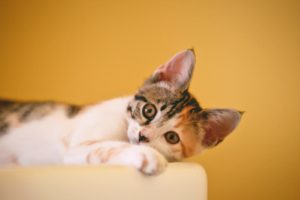
If your cat has hairballs, there are remedies that can reduce their frequency.
Hairballs are a common yet naturally unpleasant substance your cat is likely to pass up sometime during his or her lifetime. While it is natural, having hairballs is a phenomenon that can become more frequent as your cat becomes a better groomer. Besides the great discomfort your cat must feel, a hairball can also, at its worst, cause a dangerous blockage. To prevent and treat any more discomfort and distress to both your cat and you, start with knowing the following causes, symptoms, and remedies for hairballs in cats.
Causes
As mentioned above, it is often the case that cats develop more hairballs as they age because they have become better at grooming themselves. You may have noticed that your cat’s tongue is a bit scratchy like sandpaper. That is because their tongues have little hooks all over their surface to help take up meat from the bone. They are carnivores after all. The better they become at removing loose hair from their coat, the more likely a hairball will develop. These hairs usually are able to go straight through the digestive tract, but occasionally a clump may get stuck inside, which your cat will generally expel by throwing it up. The longer a cat’s fur, the more they may experience that nasty ball.
Symptoms
If you hear that disturbing sound—your cat hacking, coughing, gagging, and retching—most likely you will shortly have a hairball on your floor. If your cat is having greater difficulty in expelling the hairball, you may see the following signs: lethargy, lack of appetite, diarrhea, constipation, and vomiting without producing anything. Your cat may even develop a distended belly. With these symptoms, you should call your vet, as these symptoms could point to a more serious blockage.
Treatments
Thankfully, there are numerous treatments that can assist your cat in getting rid of these clumps and prevent their frequency. Grooming your cat routinely is a good place to start. It can be both relaxing to you and your cat and prevent those shedding hairs from getting in your cat’s digestive system. Feeding your cat food designed specifically to help strengthen the fur and reduce loose hairs can help. Giving your cat a teaspoon of fish oil or butter or a laxative with her food can lubricate your cat’s digestive tract for better digestion. Lastly, if you think your cat is grooming him or herself excessively, you can encourage him or her to engage in other activities such as playing.
Trust the Care of Your Pet to the Professionals at Everhart Veterinary Medicine!
At Everhart Veterinary Medicine, our veterinary professionals strive to provide your pet with the very best of veterinary care. We believe that the best care for your pet should be provided by experienced, compassionate, and knowledgeable veterinary professionals. With two Maryland locations in both Baltimore and Pasadena, we are always ready to welcome your pet as a new patient! Give us a call today at 410-355-3131 or 410-793-7670! For more information, as well as updates on veterinary news and topics, visit us on Facebook, Twitter, LinkedIn, or Pinterest!
